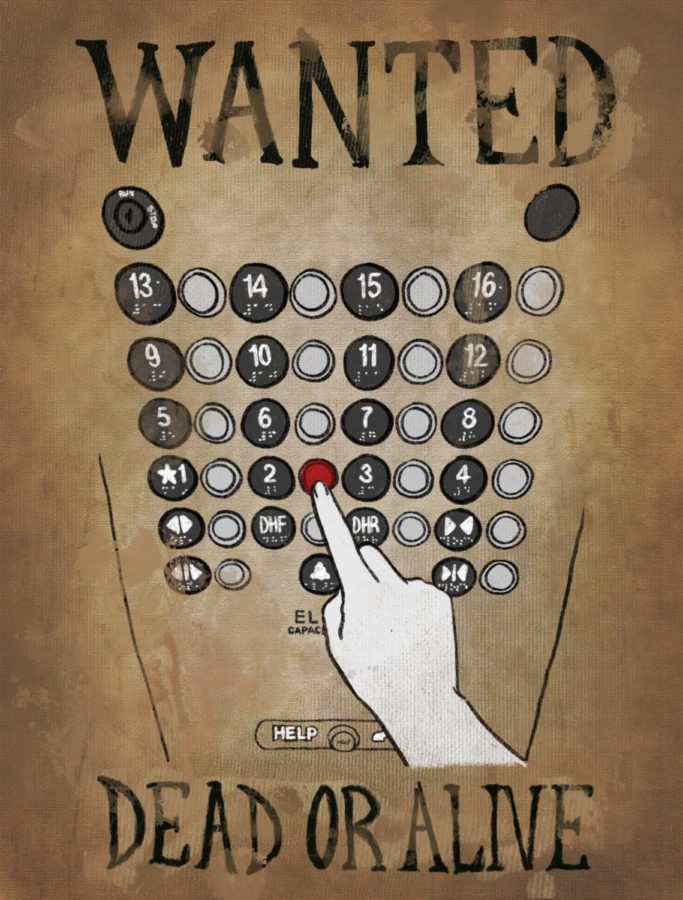Anyone who’s lived in a multistory residence can tell you that every second spent waiting for the elevator dilates into about a thousand years of inter-floor purgatory. As the clock ticks closer and closer to the beginning of the first class of the day, your average student will often give up on waiting for the elevator in favor of a mad dash down several flights of stairs—provided they live on a floor from which this is feasible. Arguably even more painful is the wait for the elevator to bring you back to your room: After a long day of classes, RSOs, sports, office hours, and the like, it’s much harder to take a full backpack up a flight of stairs than down it.
Woodlawn West Residential Commons stands at a monstrous 16 stories tall—a veritable monolith south of the Midway that houses about half of the more than 1,200 undergraduates living in Woodlawn as a whole. Within the Woodlawn community, there is a sort of unofficial, unspoken elevator rule observed by many in the houses: If you live on the third floor or below, you better not take the elevator. No one ever says anything, but if you step into the elevator on the first floor and press “2,” you’re going to get some funny looks. While a long, crowded wait for the elevator is a completely understandable frustration, it is also egregiously misplaced: For those who need to take the elevator and for those who don’t but still prefer to, annoyance at one another only creates discomfort and animosity between strangers.
The fact is, there are an uncountable number of reasons that a person might feel the need to take the elevator up just one floor. They might have bad knees. They might not have eaten for a while. They might just be really tired. You wouldn’t want someone to blame you for taking the elevator in these situations, so why would you hold a grudge against someone else?
In addition, students with disabilities should not feel pressured to announce their disabilities every time they get in the elevator in order to dispel the silent judgmental stares of their fellow riders. This is a common enough problem in the world outside of college—there are countless stories of disabled people needing to prove themselves disabled for things like parking spaces and food allergies. For those with stigmatized conditions, sharing medical information can be an embarrassing ordeal, and it can lead to discrimination in the professional world. Plus, nothing says “dehumanizing” like having a bunch of strangers debate whether you’re “disabled enough” for your accommodations.
And here’s the kicker: Sometimes people will take the elevator up just one floor for no reason at all—and that should be acceptable too. There’s simply no way to know if someone has a “valid” reason for taking the elevator or if they’re just “being lazy,” and more importantly, it shouldn’t even matter. The elevator is there to be used by anyone and everyone, and whether you live on a high floor or a low floor, whether or not you have a disability, no one reserves the right to tell you when to use the elevator. If there is an unreasonable amount of elevator delays, the onus is on the University of Chicago administration to find solutions—not on students to police themselves and others on their elevator usage.
This philosophy extends to other accessible spaces as well and highlights a trend in UChicago facilities. In Renee Granville-Grossman Residential Commons, for example, each bathroom has one larger accessible shower and two smaller showers. My spine was fused a couple of years ago for scoliosis; I cannot use the smaller showers because I am physically unable to reach below my thighs in a small space. Staying in that dorm over the summer, I was often faced with people who appeared able-bodied using the accessible shower. At first, this was a source of frustration for me: I needed to use that one. Eventually, though, it occurred to me: Regardless of whether someone is able-bodied or not, why should I hold it against them for wanting to use the larger shower? Shouldn’t the dorm have been designed with facilities of a reasonable size so that able-bodied individuals can be comfortable in the non-accessible spaces as well?
There’s enough accessibility issues on campus to write a whole series on, and this piece is not meant to be an exhaustive critique of campus facilities. My aim here is to encourage students to be more patient with one another, to remember that disability isn’t always visible and can affect anyone, and to consider the possibility that maybe it isn’t such a bad thing that people want to be comfortable.
Katherine Weaver is a second-year in the College.








